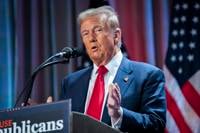Mexicans are worried that threats by U.S. President-elect Donald Trump to impose 25% tariffs could affect a wide range of iconic Mexican products, some of which support entire regional economies. In western Mexico, few crops are as important as avocados. But avocado growers, pickers and packers worry that U.S. consumers facing higher prices might just skip the guacamole. And it won’t be just Mexican producers who are affected. U.S. consumers may also be howling. A Mexican business leader said U.S. agriculture officials got many complaints when the U.S. government halted import inspections on Mexican avocados in 2022.
President-elect Donald Trump is declaring a win on stopping illegal immigration through Mexico after talking with that country’s leader. But Mexican President Claudia Sheinbaum is suggesting Mexico is already doing its part and has no interest in closing its borders. The two spoke on Wednesday, just days after Trump threatened to impose sweeping new tariffs on Canada and Mexico as part of his effort to crack down on illegal immigration and drugs. Trump said Sheinbaum “agreed to stop Migration through Mexico.” Sheinbaum indicated separately on social media that she told Trump that Mexico is already “taking care of” migrant caravans, calling it an “excellent conversation.”
Mexican President Claudia Sheinbaum has suggested Mexico could retaliate with tariffs of its own, after U.S. President-elect Donald Trump threatened to impose 25% tariffs on Mexican goods if the country doesn’t stop the flow of drugs and migrants across the border. Sheinbaum says she is willing to engage in talks on the issues, but said drugs were a U.S. problem. She says "one tariff would be followed by another in response, and so on until we put at risk common businesses,” referring to U.S. automakers that have plants on both sides of the border.
U.S. stocks rose to records after Donald Trump’s latest talk about tariffs created only some ripples on Wall Street. The S&P 500 rose 0.6% to reach another all-time high. The Dow Jones Industrial Average added 0.3% to its own record set the day before, while the Nasdaq composite rose 0.6% as Big Tech stocks helped lead the way. Stock markets abroad saw mostly modest losses after President-elect Trump said he plans to impose sweeping tariffs on Mexico, Canada and China as soon as he takes office. U.S. automakers and other companies that could be hurt particularly by such tariffs fell.
Trump's threat to impose tariffs could raise prices for consumers, colliding with promise for relief
If Donald Trump makes good on his threat to slap 25% tariffs on everything imported from Mexico and Canada, the price increases that could follow will collide with his campaign promise to give American families a break from inflation. Economists and industry officials say companies would have little choice but to pass along the added costs, dramatically raising prices for food, clothing, automobiles, booze and other goods. The president-elect floated the tariff idea and an additional 10% tax on goods from China, as a way to force the countries to halt the flow of illegal immigrants and drugs into the U.S. But his posts Monday threatening tariffs on his first day in office could be a negotiating ploy to get the countries to change behavior.
President-elect Donald Trump is threatening to impose sweeping new tariffs on Mexico, Canada and China as soon as he takes office as part of his efforts to crack down on illegal immigration and drugs. He said he would impose a 25% tax on all products entering the country from Canada and Mexico, and an additional 10% tariff on goods from China as one of his first executive orders. The tariffs, if implemented, could dramatically raise prices for American consumers on everything from gas to automobiles to agricultural products. The U.S. is the largest importer of goods in the world, with Mexico, China and Canada its top three suppliers.
U.S. President-elect Donald Trump has threatened to sharply raise tariffs on all Chinese imports and close some loopholes Chinese exporters currently use to sell their products more cheaply in the U.S. If enacted, his plans would likely raise prices in America and squeeze sales and profit margins for Chinese exporters. Smaller Chinese companies like those in Yiwu — an eastern Chinese city that is home to the world’s largest wholesale market — are bracing for the impact. Exporters are maneuvering to cope with the potential tariffs by becoming less reliant on the American market and selling more elsewhere. Some are moving production to Southeast Asia and elsewhere to avoid the duties.
Mexican president suggests Mexico could respond to any of Donald Trump's tariffs with tariffs of its own on US products.
Mississippi is highly dependent upon federal dollars, both for its operating budget and for taxable spending by individuals and businesses. Th…
President-elect Donald Trump's new Treasury chief needs to hit the ground running once he takes office, tasked with rolling out his boss's economic vision and grappling with the country's debt limit.



















